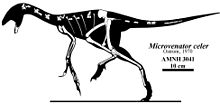Microvenator
| Microvenator Temporal range: Early Cretaceous,
| |
|---|---|

| |
| Skeletal restoration | |
| Scientific classification | |
| Domain: | Eukaryota |
| Kingdom: | Animalia |
| Phylum: | Chordata |
| Clade: | Dinosauria |
| Clade: | Saurischia |
| Clade: | Theropoda |
| Family: | †Caenagnathidae |
| Genus: | †Microvenator Ostrom, 1970 |
| Species: | †M. celer
|
| Binomial name | |
| †Microvenator celer Ostrom, 1970
| |
Microvenator (meaning "small hunter") is a genus of dinosaur from the Early Cretaceous Cloverly Formation in what is now south central Montana. Microvenator was an oviraptorosaurian theropod. The holotype fossil is an incomplete skeleton, most likely a juvenile, with a living length of about 1.2 m. The adult size of Microvenator is estimated to be closer to 3 m long. Microvenator celer is primitive and may be the "sister taxon to all other oviraptorosaurs."[1]

Barnum Brown collected the type specimen (AMNH 3041) of this animal in 1933 and included what are now known to be Deinonychus teeth with the specimen, and thought that his new animal had a small body with an unusually large head. Thus, he informally dubbed it "Megadontosaurus" ("big-toothed lizard"). He had illustrations made of it, but never published the name, a fate shared with several other Cloverly dinosaurs (Deinonychus, Sauropelta and Tenontosaurus). AMNH 3041 includes parts of the skull. hand, foot, left fibula, 23 vertebrae, 4 ribs, and fairly complete ilia, pubes, femora, tibiae, the left ankle, left humerus, radius, and ulna. In 1970 John Ostrom described the type specimen and gave it its formal name. Ostrom also referred a single tooth from the Yale Peabody Museum collection, YPM 5366, to this new species.[2] The illustrations that Brown had prepared were finally published in a detailed and exhaustive monograph by Mackovicky and Sues in 1998. They were unable to confirm that YPM 5366 belongs to Microvenator. They confirmed that Microvenator is an oviraptorosaurian, and that it is the earliest known member of this group from North America.[3]
See also
Footnotes
References
- Ostrom, John H. (1970). "Stratigraphy and paleontology of the Cloverly Formation (Lower Cretaceous) of the Bighorn Basin area, Wyoming and Montana” Ibid. 35:234pp.
- Mackovicky, Peter J., Sues, Hans-Dieter. (1998). "Anatomy and phylogenetic relationships of the Theropod Dinosaur Microvenator celer from the Lower Cretaceous of Montana” American Museum Novitates. Number 3240, 27pp. 27 August 1998.
- Norell, M.A., Gaffney, E.S., and Dingus, L. 1995. Discovering Dinosaurs in the American Museum of Natural History. Alfred A. Knopf, Inc.:New York, 204 p.
- Varricchio, D. J. 2001. Late Cretaceous oviraptorosaur (Theropoda) dinosaurs from Montana. pp. 42–57 in D. H. Tanke and K. Carpenter (eds.), Mesozoic Vertebrate Life. Indiana University Press, Indianapolis, Indiana.


